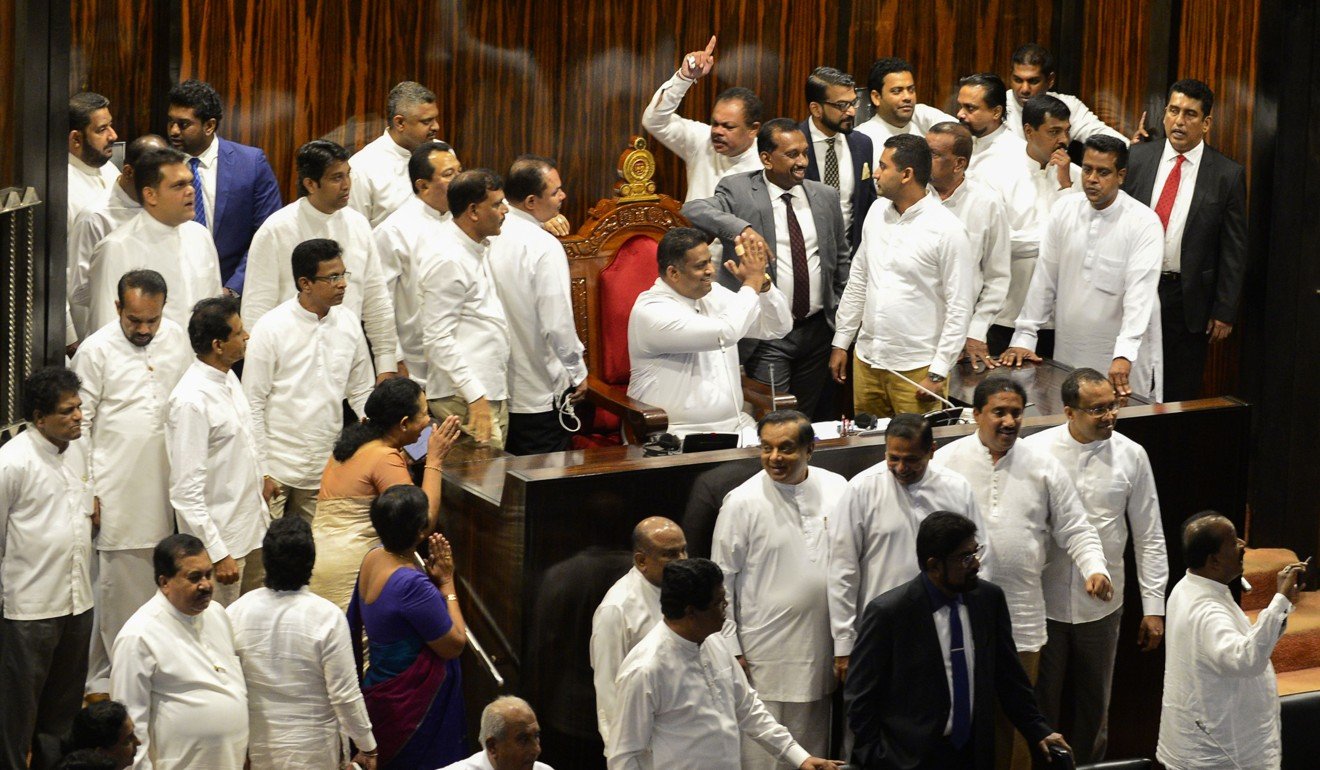Fresh chaos in Sri Lanka’s parliament as chilli powder and chairs thrown by MPs
- It follows a mass brawl on Thursday when rival lawmakers exchanged blows after the speaker announced the country had no prime minister or government
- The political crisis began on October 26, when Prime Minister Ranil Wickremesinghe was sacked and replaced with a former strongman
Police escorted Speaker Karu Jayasuriya into the chamber and held boards around him to protect him from being hit by the angry Rajapaksa loyalists, who did not allow him to sit in the speaker’s chair.
An ordinary office chair was brought in as a makeshift replacement, but rioting MPs grabbed that too, breaking it into pieces that were then used as projectiles to attack rivals and police.

Standing in a corner with a human shield of khaki-clad constables, the speaker, in his usual black and gold robes, used a wireless microphone to take a voice vote on a revised no-confidence motion against Rajapakse. He then adjourned the house until Monday
Rajapakse lost a similar vote on Wednesday, but refused to step down saying that vote was not taken properly. His party had acknowledged that they did not command a majority in the 225-member assembly despite attempts to engineer defections.
Opposition lawmaker R. Sampathan accused Rajapaksa loyalists of preventing a roll-call vote on the motion, as requested by President Maithripala Sirisena.

On Thursday, Sirisena held an emergency meeting with the leaders of the opposition parties that voted for the first no-confidence motion against Rajapaksa and asked them to take up the motion again, allow it to be debated and then put to a roll-call vote.
They have behaved as beasts, not as human beings
Sirisena held the meeting following the chaos in parliament on Thursday, when rival lawmakers exchanged blows, leaving one injured, after the speaker announced the country had no prime minister or government because of Wednesday’s no-confidence vote.
According to former sergeant-at-arms Wijaya Palliyaguruge, it is unprecedented in Sri Lanka for a speaker to be prevented from entering the chamber.
“This is also the first time that the speaker had to come in with police protection,” he said.
Outside the chamber, MPs Gamini Jayawickrama Perera and Vijitha Herath could be seen rubbing their eyes, with splodges of chilli splattered across their robes.
“They have behaved as beasts, not as human beings,” Herath told reporters, with a large bandage across his forehead.

The British High Commissioner, or ambassador, to Sri Lanka, James Dauris, echoed international concern over violence in the country’s parliament, a legacy from British colonial rule that ended in 1948.
No parliament can perform its role when its own members stop it from doing so
“Sri Lankans have again seen deplorable behaviour by some MPs, unbecoming of them and of their noble institution,” he said on Twitter. “No parliament can perform its role when its own members stop it from doing so.”
Sri Lanka has been in a political crisis since October 26, when Sirisena abruptly sacked Prime Minister Ranil Wickremesinghe and appointed Rajapaksa. Wickremsinghe says he still has the support of a majority in parliament.
Rajapaksa, a former president, is considered a hero by some in the ethnic Sinhalese majority for ending a long civil war by crushing ethnic Tamil Tiger rebels. However, his time in power was marred by allegations of wartime atrocities, corruption and nepotism.
Tensions had been building between Sirisena and Wickremesinghe for some time, as the president did not approve of economic reforms introduced by the prime minister. Sirisena has also accused Wickremesinghe and another Cabinet member of plotting to assassinate him, a charge Wickremesinghe has repeatedly denied.
If recognised by Sirisena, who ultimately commands the country’s armed forces and police, Friday’s no-confidence motion would leave the country without a prime minister.
It is unclear if Wickremesinghe will be restored to his position by parliament when it resumes on Monday. Also uncertain is how Rajapaksa and his supporters will respond to the result.
Additional reporting by Agence France-Presse
Chaotic scenes as mass brawl breaks out in Sri Lankan parliament

